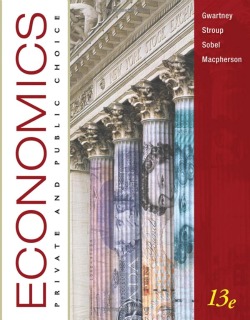 This textbook gets an F.The financial collapse of 2008 has sent the authors and publishers of economics textbooks scrambling to update their books with lessons about the Great Recession — you know, how to avoid future planetary economic meltdowns, revive a steamrolled economy, and be responsible economic leaders.
This textbook gets an F.The financial collapse of 2008 has sent the authors and publishers of economics textbooks scrambling to update their books with lessons about the Great Recession — you know, how to avoid future planetary economic meltdowns, revive a steamrolled economy, and be responsible economic leaders.
So in the face of another kind of meltdown — climate change in this case — one would think they’d be falling head over heels to ensure the economic leaders of tomorrow have the most up-to-date information to help avoid the possibility of an economy-wrecking catastrophe.
… Right?
Not always. I took a look at 16 of the most popular college economics textbooks and found mixed results. When it comes to teaching climate science and policy, some economics books made the grade, and some didn’t.
Well-known economists like Paul Krugman and Greg Mankiw might be on opposite sides of the political spectrum, but they both nailed it in their books: the science is up-to-date and their explanations of the problem — and solutions — merit an A. In contrast, the book coauthored by Federal Reserve Chairman Ben Bernanke fell short, earning a measly C because it largely omits any mentions of climate change and provides a disjointed treatment of environmental economics.
And then there’s the bottom of the barrel.
I’m most troubled by the fact that Economics, 18th ed. by Campbell McConnell, Stanley Brue, and Sean Flynn — a book I gave a C- for making grotesque errors in reporting findings from the 2007 IPCC report — commands 20 percent of the economics textbook market. Not only are the authors confused about the facts, they’re also taking thousands of students down with them.
But the worst offender — and the only book to merit an F — was Economics: Private and Public Choice, 13th ed., by James Gwartney, Richard Stroup, Russell Sobel, and David Macpherson. The poor student subjected to this train wreck would likely walk away believing that human activity isn’t connected to recent warming trends, that climate change is a scientific conspiracy to get funding, and that economists agree that no regulation is warranted. (The folks at Change.org have started a petition asking the publisher to revise or kill this textbook.)
You can see the full report card, along with excerpts and reviews, at Sightline Institute’s site.



